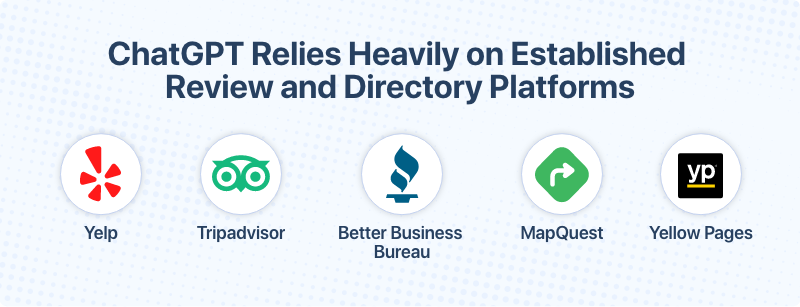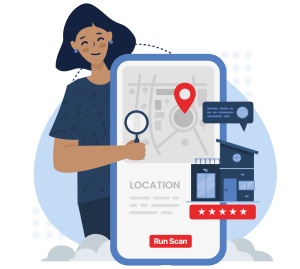When business owners and marketers think about local search visibility, the first priority is ranking on Google Search and Maps. But in 2025, more and more people are asking their questions directly to AI chat platforms like ChatGPT. That includes local questions; everything from "what are the best coffee shops with wifi in [neighborhood]" to "who are the top real estate agents in [city]?"
For local businesses, this shift raises an important question: Where does ChatGPT source business information from?
If you've ever wondered why some businesses show up in ChatGPT's responses while others don't, understanding ChatGPT's local search data sources is key. Just like traditional search engines pull data from a variety of online signals, ChatGPT relies on multiple inputs to provide local recommendations.
Below, we'll walk through ChatGPT's major sources for local business data, why they matter, and how you can check what information is being pulled for your business.
What Are ChatGPT's Local Search Data Sources?
ChatGPT doesn't "crawl" the web in real time the way a search engine like Google does. Instead, it draws from its trained knowledge base and combines that with live integrations (like Bing) and trusted data sources when providing local search answers.
Here are the primary places ChatGPT pulls business info from:
1. Bing Places for Business
One of the biggest data sources for ChatGPT's local recommendations is Bing Places for Business.
ChatGPT has a direct integration with Bing search, and Bing Places listings feed into that ecosystem. If your business has a complete and optimized Bing Places profile, there's a strong chance that ChatGPT will reference this information when providing local business responses.
It's worth noting, though, that Bing Places doesn't dictate ranking order in ChatGPT answers. The tool may pull your basic info from Bing but still prioritize other businesses in its actual recommendation list depending on context, reviews, or citations from other sources.
Takeaway: If you haven't claimed or optimized your Bing Places profile, now is the time to do it. It's a direct pipeline into ChatGPT's local data.

2. Third-Party Publications
Beyond Bing, ChatGPT frequently cites online publications that cover local businesses. For example, if you ask ChatGPT about the best restaurants in Toronto, you might see it reference articles from outlets like Eater.com or Time Out.
These publications provide curated lists and reviews, which ChatGPT treats as trusted, editorial content. Since these sites often have strong domain authority and local expertise, ChatGPT uses them to back up its recommendations.
Takeaway: Being featured in a reputable food blog, news outlet, or niche publication can directly influence whether ChatGPT recommends your business.

3. Business Websites
ChatGPT also pulls information directly from business websites. If a restaurant's website lists its menu, opening hours, and location, ChatGPT may cite this when responding to user queries.
This is especially common when the AI is asked for specific details, like "Does this restaurant serve vegan options?" or "What's the phone number for ABC Dental in [city]?"
Takeaway: Keep your business website updated, easy to navigate, and rich with relevant details. Schema markup (structured data) can also improve the chances that AI tools read and present your information correctly.

4. Chamber of Commerce Sites
Local Chambers of Commerce and other official business associations are another source ChatGPT uses for local business info. These websites tend to have high credibility and accurate, up-to-date directories of local businesses. For ChatGPT, citing an official Chamber listing provides an extra layer of authority and trust.
Takeaway: If your business isn't listed with your Chamber of Commerce or other local business associations, consider joining, both for community visibility and AI search benefits.

5. Reputable Directories and Review Sites

ChatGPT leans heavily on established review and directory platforms, including:
- Yelp
- Tripadvisor
- Better Business Bureau (BBB)
- MapQuest
- Yellow Pages
These platforms provide structured business listings, customer reviews, and other data that AI models can easily pull from and cite.
If your business has consistent NAP (Name, Address, Phone) data and strong reviews across these directories, ChatGPT is more likely to reference you in responses.
Takeaway: Don't neglect these classic directories, as they're heavily influencing AI search visibility.

6. Niche Listing Sites
In addition to broad directories, ChatGPT also taps into industry-specific platforms. For restaurants, that might be OpenTable. For hotels, Booking.com or Hotels.com. For medical providers, niche healthcare directories.
These sites provide rich, structured listings that make it easy for ChatGPT to surface accurate, industry-relevant details.
Takeaway: Identify your industry's major niche directories and ensure your business is listed, optimized, and reviewed.

7. City Guides and Local Publications
AI also uses local city guides and blogs as data sources. These could include tourism websites, local magazines, or even hyperlocal blogs dedicated to neighborhoods.
For example, a Montreal coffee shop might get mentioned in RestoMontreal's dining guide or a popular local blog about a specific neighborhood's food spots.
Takeaway: Building relationships with local writers, influencers, and publications can boost your business's chances of being recommended by ChatGPT.

8. Social Media (Especially Facebook)
Finally, ChatGPT may also pull from social media platforms, with Facebook Pages being a particularly common source for business info. Many businesses keep their Facebook listings more current than their websites, which makes it a valuable source for hours, events, and contact information.
Takeaway: Keep your Facebook Page and other key social profiles up-to-date, both for your customers and AI visibility.

Can You Check Where ChatGPT Sources Business Information From for Your Business?
If you're wondering how ChatGPT sees your business, there are two effective ways to check.
1. Ask ChatGPT Directly
The simplest method is to ask ChatGPT for local recommendations in your category and city.
Look at the list of businesses it provides, and check which citations appear. If your business shows up, note where ChatGPT is pulling your info from, whether it's your website, Yelp, Tripadvisor, or a local city guide.
This exercise is useful not only to confirm your visibility but also to benchmark against competitors.
2. Run a ChatGPT Search Visibility Scan in Local Falcon
A more advanced, local SEO-focused method is to use Local Falcon's ChatGPT search visibility scans.
This tool runs simultaneous scans for multiple queries across your service area and compiles all the sources ChatGPT cites for both your business and your competitors.
The advantage here is scale: instead of just one or two manual queries, you get a full map of your ChatGPT visibility and sources. This gives you insights into where competitors are getting mentions (for example, maybe they're listed on a niche directory you're missing) and how you can expand your footprint.
Takeaway: If you're serious about improving your AI visibility, running these scans regularly helps you stay ahead of competitors.

Frequently Asked Questions About ChatGPT Local Search
1. Does ChatGPT use Google Business Profile data?
No. While Google Business Profile (GBP) is the primary local listing tool for Google Search and Maps, ChatGPT does not have a direct integration with it. Instead, it pulls business data from Bing Places for Business and other reputable online sources.
2. How often does ChatGPT update its business data?
ChatGPT itself does not crawl the web continuously. Instead, it's trained on a fixed dataset and pulls information from integrations (like Bing) and trusted sources in real time. If your Bing Places listing or Yelp profile updates today, ChatGPT may be able to access and reflect that change almost immediately if prompted by a query. For other sources like business websites or directories, the refresh cycle depends on how quickly those platforms update and are indexed by Bing.
3. Can businesses pay to be featured in ChatGPT local results?
No, at least not currently. ChatGPT does not accept paid placements for local recommendations. Visibility is based on data accuracy, relevance, and authority of sources.
4. What if ChatGPT shows outdated or incorrect information about my business?
If you see wrong information being presented, the best steps are:
- Update your Bing Places for Business profile (this is the most direct source).
- Correct your listings on major directories like Yelp, BBB, and Tripadvisor.
- Keep your business website updated with accurate details.
Since ChatGPT relies on reputable sources, correcting your info in those ecosystems usually ensures it gets updated in AI answers as well.
5. Why does my competitor show up in ChatGPT but my business doesn't?
There are a few possible reasons:
- Your competitor may be listed in more directories or niche listing sites.
- They may have been featured in local publications or blogs that ChatGPT trusts.
- Their Bing Places profile might be more complete and better optimized.
Running a ChatGPT visibility scan in Local Falcon can help uncover exactly which sources your competitors are benefiting from so you can match (or exceed) them.
6. Should I still focus on traditional SEO if people are using ChatGPT for local search?
Absolutely. Traditional SEO and AI visibility go hand in hand. Google search remains the dominant channel for local discovery, but the rise of ChatGPT means you need to ensure your business is visible in all major data sources. In many ways, optimizing your website, directories, and local citations benefits both Google rankings and ChatGPT recommendations.
Final Thoughts
Local search is evolving quickly. While Google remains dominant, platforms like ChatGPT are increasingly shaping how people discover local businesses.
The good news is that the fundamentals of local SEO still apply. Having accurate listings, building citations, earning media mentions, and maintaining an updated website all feed into ChatGPT's local knowledge base.
If you want ChatGPT to recommend your business, focus on the sources it trusts most: Bing Places, reputable directories, industry listings, local publications, and your own website.
By proactively managing your visibility across these channels, and checking how ChatGPT currently sees your business, you can stay ahead of future customer search trends and the competition alike in this new era of AI-driven local search.


